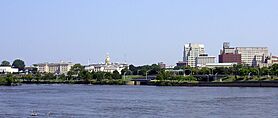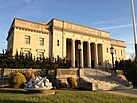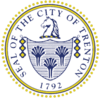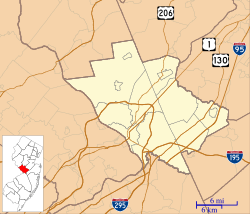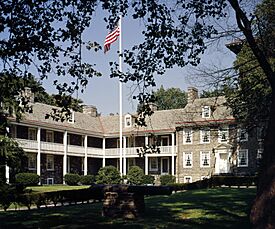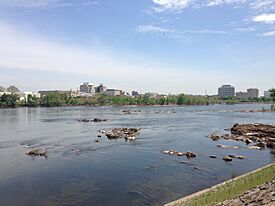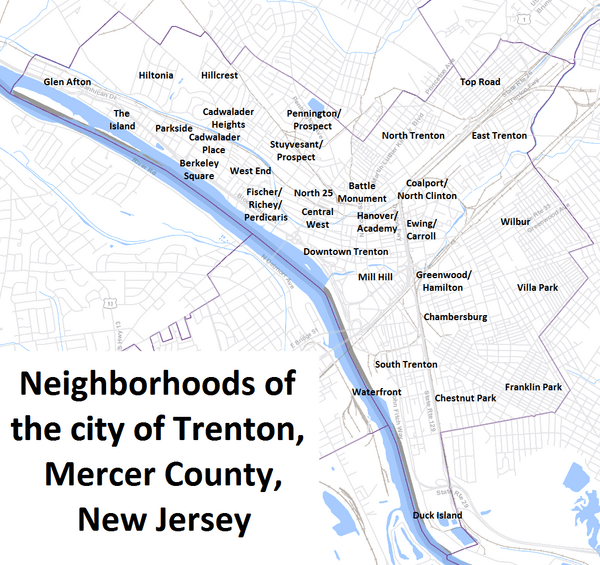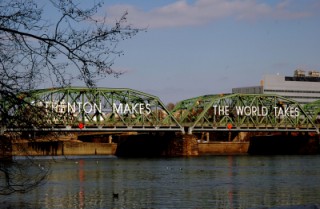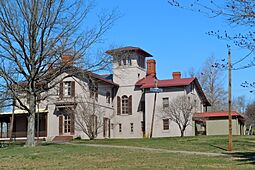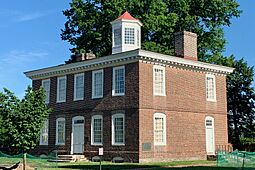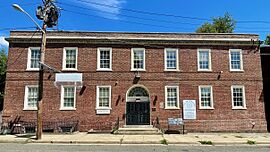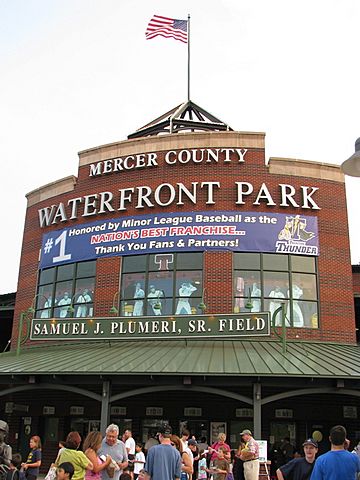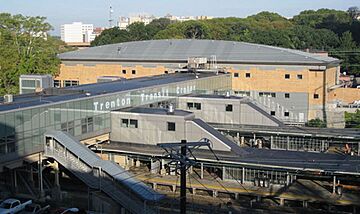Trenton, New Jersey facts for kids
Quick facts for kids
Trenton, New Jersey
|
|||
|---|---|---|---|
|
Downtown Trenton along the Delaware River
Trenton City Hall
Turning Point Church
Trenton War Memorial
Broad Street National Bank
|
|||
|
|||
| Nickname(s):
The Capital City,
Turning Point of the Revolution |
|||
| Motto(s):
"Trenton Makes, The World Takes"
|
|||
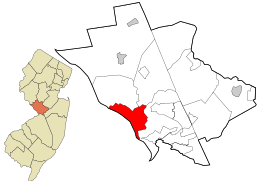
Location of Trenton in Mercer County highlighted in red (right). Inset map: Location of Mercer County in New Jersey highlighted in orange (left).
|
|||
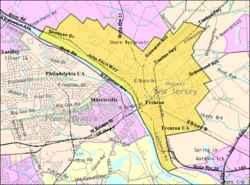
Census Bureau map of Trenton, New Jersey <mapframe text="Interactive map of Trenton, New Jersey" zoom="8" width="250" height="250">{"type": "ExternalData", "service": "geoshape", "ids": "Q25330"}</mapframe>
|
|||
| Country | |||
| State | |||
| County | Mercer | ||
| Founded | June 3, 1719 | ||
| Incorporated | November 13, 1792 | ||
| Named for | William Trent | ||
| Government | |||
| • Type | Faulkner Act | ||
| • Body | City Council | ||
| Area | |||
| • State capital | 8.20 sq mi (21.25 km2) | ||
| • Land | 7.61 sq mi (19.70 km2) | ||
| • Water | 0.60 sq mi (1.55 km2) 7.62% | ||
| Area rank | 229th of 565 in state 9th of 12 in county |
||
| Elevation | 59 ft (18 m) | ||
| Population
(2020)
|
|||
| • State capital | 90,871 | ||
| • Estimate
(2023)
|
89,620 | ||
| • Rank | 382nd in country (as of 2022) 10th of 565 in state 2nd of 12 in county |
||
| • Density | 11,989.8/sq mi (4,629.3/km2) | ||
| • Density rank | 25th of 565 in state 1st of 12 in county |
||
| • Urban | 370,422 (US: 112th) | ||
| • Urban density | 2,782.4/sq mi (1,074.3/km2) | ||
| • Metro | 387,340 (US: 143rd) | ||
| Time zone | UTC−05:00 (Eastern (EST)) | ||
| • Summer (DST) | UTC−04:00 (Eastern (EDT)) | ||
| ZIP Codes |
08608–08611, 08618–08620, 08625, 08628, 08629, 08638
|
||
| Area code | 609 | ||
| FIPS code | 3402174000 | ||
| GNIS feature ID | 0885421 | ||
Trenton is the capital city of New Jersey, a state in the United States. It is also the main city of Mercer County. For a short time, from November 1 to December 24, 1784, Trenton was even the capital of the entire United States!
Trenton and Princeton are the two main cities in the Trenton–Princeton area. This area is part of the larger New York metropolitan area. However, Trenton is also very close to the Philadelphia metropolitan area.
In 2020, Trenton had about 90,871 people living there. This makes it the 10th largest city in New Jersey. Trenton is special because it's the only city in New Jersey with three different train systems: Amtrak, NJ Transit, and SEPTA. This has helped the city grow and develop new areas around its train stations.
Trenton has a long history, dating back to June 3, 1719. That's when a "constable" (like a police officer) was first appointed for the area. The city was officially formed on November 13, 1792. Over the years, Trenton grew by adding nearby towns and areas.
Contents
Discovering Trenton's Past
The first people to live in the Trenton area were the Lenape Native Americans. The Axion band was the largest tribe living along the Delaware River in the mid-1600s.
The first European settlers arrived in 1679. They were Quakers from England, seeking religious freedom. They settled in an area called the Falls of the Delaware.
By 1719, the town was named "Trent-towne." It was named after William Trent, a major landowner. Later, the name was shortened to "Trenton."
Trenton's Role in the American Revolution
During the American Revolutionary War, Trenton was very important. It was the site of the famous Battle of Trenton. On December 25–26, 1776, George Washington and his army bravely crossed the icy Delaware River. They surprised and defeated the Hessian troops (German soldiers fighting for the British) stationed in Trenton.
Another battle, the Battle of the Assunpink Creek, happened here on January 2, 1777. After the war, the Congress of the Confederation met in Trenton for two months in 1784.
In 1789, Trenton welcomed George Washington on his way to become the first president. The Trenton Battle Monument, a tall granite column with a statue of Washington, was built in 1893. It remembers this important battle.
Becoming New Jersey's Capital
Trenton became the capital of New Jersey in 1790. The New Jersey State House was built in 1792. It is the third-oldest state house in the country. In 1799, the U.S. government even moved its offices to Trenton for a few months. This happened because of a yellow fever outbreak in Philadelphia, which was the capital at the time.
Trenton's Industrial Growth
Trenton has a long history of industry. It had an iron industry since the 1730s and a pottery industry since 1723. The completion of the Delaware and Raritan Canal and the Camden and Amboy Railroad in the 1830s helped Trenton's industries grow.
In 1848, engineer John Roebling moved his wire rope factory to Trenton. His company made cables for bridges, including the famous Brooklyn Bridge. Trenton became known for making things like rubber, wire rope, and ceramics. Its motto, "Trenton Makes, The World Takes," shows its history as a manufacturing hub.
Civil Rights and Community Challenges
In 1948, a group of Black men known as the Trenton Six were arrested. Their case raised important questions about fairness and justice. With help from groups like the NAACP, they eventually gained their freedom. This event is a significant part of Trenton's history of civil rights.
In the 1950s, a large park called Stacy Park was mostly replaced by Route 29. This highway disconnected the city from its riverfront.
The 1968 Riots
After the assassination of Martin Luther King Jr. in April 1968, civil unrest occurred in many U.S. cities, including Trenton. Many businesses in downtown Trenton were damaged. Firefighters faced challenges while trying to put out fires. This event had a lasting impact on the city, especially the Battle Monument neighborhood.
Exploring Trenton's Landscape
Trenton covers about 8.21 square miles (21.25 km2). It is the second-smallest capital city in the United States by land area.
Several bridges cross the Delaware River, connecting Trenton to Morrisville, Pennsylvania. These include the Trenton–Morrisville Toll Bridge and the Lower Trenton Bridge. The Lower Trenton Bridge famously displays the city's motto: "TRENTON MAKES - THE WORLD TAKES."
Trenton is located near the geographic center of New Jersey. People sometimes debate if it's part of North Jersey or South Jersey. Many locals consider it part of Central Jersey.
Trenton is one of only two state capitals that border another state. The other is Carson City, Nevada.
Trenton's Neighborhoods
Trenton has many different neighborhoods. Historically, it was home to large Italian, Hungarian, and Jewish communities. Today, it has a diverse population, including many African Americans and newer immigrants from Latin America.
- Chambersburg: This neighborhood in South Trenton was once famous for its Italian restaurants. Now, it has a large Latino community, with many immigrants from Mexico, Guatemala, and Nicaragua. There's also a growing Asian community here.
- North Trenton: Once a middle-class area, it still has important historic sites. It's home to a large Polish-American community and the historic Shiloh Baptist Church, the oldest African American church in the city. The Battle Monument, marking the site of the Battle of Trenton, is also in North Trenton.
- South Ward: This is a diverse area with Latin American, Italian-American, and African American residents.
- East Ward: The smallest neighborhood, home to the Trenton Transit Center and Trenton Central High School.
- West Ward: This area has more suburban-style neighborhoods.
Trenton's Weather
Trenton has a humid subtropical climate. This means it has hot, humid summers and cold, damp winters.
- Summers: July is usually the hottest month. Temperatures can reach or go above 90°F (32°C) about 22 days a year.
- Winters: January is the coldest month. Temperatures can drop to 10°F (-12°C) or lower a few nights each year.
- Rainfall: Trenton gets about 45 inches (115 cm) of rain per year, spread fairly evenly. July is often the wettest month.
- Snowfall: The amount of snow can change a lot each year. On average, Trenton gets 24 to 30 inches (61 to 76 cm) of snow per winter.
Trenton's Economy
In the late 1800s and early 1900s, Trenton was a major manufacturing city. The slogan "Trenton Makes, The World Takes" on the Lower Free Bridge shows this history. The city made things like rubber, wire rope, and ceramics.
However, in the 1970s, many manufacturing jobs left Trenton. Today, the biggest employer in Trenton is the State of New Jersey. Thousands of state workers come into the city each weekday.
Trenton is part of an Urban Enterprise Zone. This program offers benefits to businesses and shoppers. For example, shoppers can pay a lower sales tax rate of 3.3125% (half the usual state rate) at eligible stores. This helps encourage businesses and jobs in the city.
Important Places to See in Trenton
- New Jersey State Museum: This museum has collections of archaeology, art, history, and natural history.
- New Jersey State House: The state's capitol building, first built in 1792.
- Trenton City Museum: Located in the beautiful Ellarslie Mansion, it shows art and items from the city's history.
- Trenton War Memorial: A building completed in 1932 to honor soldiers from Mercer County. It has a large theater.
- Old Barracks: Built in 1758, these barracks housed British soldiers. They were used by both sides during the Revolutionary War and are the last colonial barracks in New Jersey.
- Trenton Battle Monument: A tall monument with a statue of George Washington. It marks where the Battle of Trenton began.
- Trenton City Hall: The city's government building, opened in 1910.
- William Trent House: Built in 1719 by William Trent, who helped plan the city of Trenton.
-
The Trenton City Museum, located at the Ellarslie Mansion in Cadwalader Park
Sports in Trenton
Trenton is close to both New York City and Philadelphia. Because of this, people in Trenton often support sports teams from both cities! You'll find fans of the Philadelphia Phillies and Eagles right next to fans of the New York Yankees and Giants.
The Trenton Thunder is a baseball team that plays at Arm & Hammer Park. They are part of the MLB Draft League.
Parks and Fun in Trenton
- Cadwalader Park: This is Trenton's largest city park, covering over 100 acres. It was designed by Frederick Law Olmsted, who also designed New York City's Central Park.
Learning in Trenton
Colleges and Universities
Trenton is home to two colleges:
- Thomas Edison State University: This university helps adult students learn from anywhere in the world.
- Mercer County Community College: This college has a campus in Trenton.
Other colleges that started in Trenton but later moved nearby include The College of New Jersey (now in Ewing Township) and Rider University (now in Lawrence Township).
Public Schools in Trenton
The Trenton Public Schools serve students from pre-kindergarten through 12th grade. The district has 25 schools, including elementary, intermediate, and high schools. The schools are always working to improve their buildings.
Students in Mercer County can also apply to special high school programs. These are offered by the Mercer County Technical Schools. They teach skills in health sciences, STEM (Science, Technology, Engineering, Math), and culinary arts.
Charter Schools in Trenton
Trenton has several charter schools. These are public schools that operate with more freedom than traditional public schools. Some examples include Capital Preparatory Charter High School and Foundation Academy Charter School.
Private Schools in Trenton
Trenton also has private schools, such as Trenton Catholic Academy. This school serves students from pre-kindergarten through 12th grade and is part of the Roman Catholic Diocese of Trenton.
Getting Around Trenton

Trenton has many roads and highways that help people travel. These include U.S. Route 1 and New Jersey Route 29. These roads connect Trenton to other major highways like Interstate 295 and Interstate 195.
Public Transportation Options
- Buses: NJ Transit buses provide service within Trenton and to nearby towns. SEPTA buses connect Trenton to parts of Pennsylvania.
- Trains: The Trenton Transit Center is a major train station. It serves:
- SEPTA's Trenton Line for local trains to Philadelphia.
- NJ Transit Rail's Northeast Corridor Line for trains to New York City.
- The River Line, a light rail system that goes to Camden, New Jersey.
- Long-distance trains: Amtrak trains also stop at the Trenton Transit Center, connecting the city to other major cities along the Northeast Corridor.
Airports Near Trenton
The closest airport for commercial flights is Trenton–Mercer Airport in Ewing Township, about 8 miles away. Larger airports like Newark Liberty International Airport and Philadelphia International Airport are also reachable by train or bus.
Trenton in the Media
Trenton has two daily newspapers, The Times and The Trentonian. It also has local radio stations like WKXW and WPST.
Even though Trenton is officially part of the Philadelphia television market, some local TV providers also carry stations from the New York City market. This means people in Trenton can often watch TV from both big cities.
|
See also
 In Spanish: Trenton para niños
In Spanish: Trenton para niños


